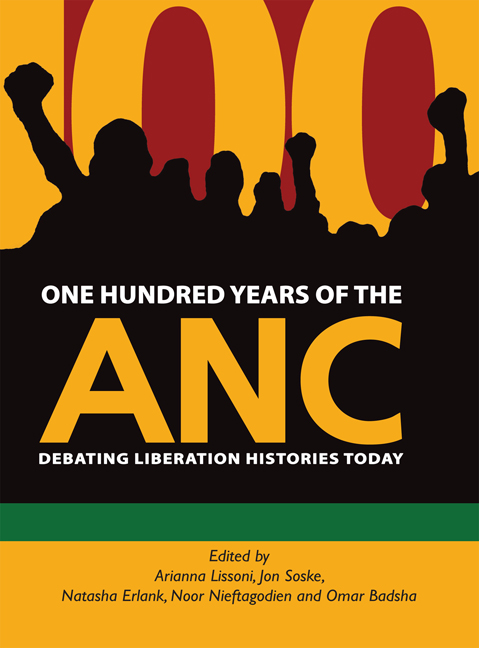Book contents
- Frontmatter
- Contents
- Acknowledgements
- Editorial Note
- FIRST KEYNOTE ADDRESS: Fragmentation and Cohesion in the ANC: The First 70 Years
- SECOND KEYNOTE ADDRESS: A Continuing Search for Identity: Carrying the Burden of History
- Chapter One One Hundred Years of the ANC: Debating Struggle History After Apartheid
- Chapter Two Religion And Resistance In Natal, 1900–1910
- Chapter Three Christianity and African Nationalism in South Africa in the First Half of the Twentieth Century
- Chapter Four Charlotte Maxeke: A Celebrated and Neglected Figure in History
- Chapter Five Imagining the Patriotic Worker: The Idea of ‘Decent Work’ in the ANC's Political Discourse
- Chapter Six Popular Movements, Contentious Spaces and the ANC, 1943–1956
- Chapter Seven Unravelling the 1947 ‘Doctors’ Pact’: Race, Metonymy and the Evasions of Nationalist History
- Chapter Eight The Politics of Language and Chief Albert Luthuli's funeral, 30 July 1967
- Chapter Nine Robben Island University Revisited
- Chapter Ten Shishita: A Crisis in the ANC in Exile in Zambia, 1980–811
- Chapter Eleven Comrade Mzwai
- Chapter Twelve Revisiting Sekhukhuneland: Trajectories of Former UDF Activists in Post-Apartheid South Africa
- Chapter Thirteen Regeneration of ANC Political Power, from the 1994 Electoral Victory to the 2012 Centenary
- Chapter Fourteen The ANC: Party Vanguard of the Black Middle Class?
- Chapter Fifteen Globalisation, Recolonisation and the Paradox of Liberation in Southern Africa
- Contributors
- Index
Chapter Fourteen - The ANC: Party Vanguard of the Black Middle Class?
Published online by Cambridge University Press: 21 April 2018
- Frontmatter
- Contents
- Acknowledgements
- Editorial Note
- FIRST KEYNOTE ADDRESS: Fragmentation and Cohesion in the ANC: The First 70 Years
- SECOND KEYNOTE ADDRESS: A Continuing Search for Identity: Carrying the Burden of History
- Chapter One One Hundred Years of the ANC: Debating Struggle History After Apartheid
- Chapter Two Religion And Resistance In Natal, 1900–1910
- Chapter Three Christianity and African Nationalism in South Africa in the First Half of the Twentieth Century
- Chapter Four Charlotte Maxeke: A Celebrated and Neglected Figure in History
- Chapter Five Imagining the Patriotic Worker: The Idea of ‘Decent Work’ in the ANC's Political Discourse
- Chapter Six Popular Movements, Contentious Spaces and the ANC, 1943–1956
- Chapter Seven Unravelling the 1947 ‘Doctors’ Pact’: Race, Metonymy and the Evasions of Nationalist History
- Chapter Eight The Politics of Language and Chief Albert Luthuli's funeral, 30 July 1967
- Chapter Nine Robben Island University Revisited
- Chapter Ten Shishita: A Crisis in the ANC in Exile in Zambia, 1980–811
- Chapter Eleven Comrade Mzwai
- Chapter Twelve Revisiting Sekhukhuneland: Trajectories of Former UDF Activists in Post-Apartheid South Africa
- Chapter Thirteen Regeneration of ANC Political Power, from the 1994 Electoral Victory to the 2012 Centenary
- Chapter Fourteen The ANC: Party Vanguard of the Black Middle Class?
- Chapter Fifteen Globalisation, Recolonisation and the Paradox of Liberation in Southern Africa
- Contributors
- Index
Summary
The African National Congress (ANC) lays claim to being the oldest living nationalist movement in Africa. Purportedly, nationalist organisations represent the interests of a putative or extant ‘nation’ against those of an oppressive external power or coloniser. When their struggles triumph, they lay claim to ownership of the previously externally dominated state, national oppression is overthrown, and the nationalist movement moves into power as the representative of the people. However, as has been wryly observed time after time, the triumph of nationalism exacerbates rather than eliminates differences the nationalist struggle had contained. Once they have assumed power, nationalist movements may claim to represent and promote the interests of the entire nation, yet regularly they have become the vehicles of particular ethnic, class, religious and/or regional interests. The category of ‘nation’ effectively dissolves, except in so far as the now-ruling party defines who and who does not belong to it.
Likewise, the sectional interests of those who control the ruling party become unambiguously identified with the ‘national interest.’ Across wide swathes of Africa the post-colonial state has come to be identified as effectively owned and controlled by a post-colonial elite which, while it may have all sort of ethnic and other properties, is, above all, defined by its use of the state machinery for purposes of material accumulation. Having taken control of the instruments of power, the nationalist movement establishes the ‘party-state’ and becomes a ‘political machine’ central to the allocation of political and economic goods and consolidation of power and well-being of the new elite.
According to its theology of the National Democratic Revolution (NDR), the ANC is uncomfortably aware of the dangers of South Africa following this trajectory. The principal dynamic of the NDR is said to be the liberation of Africans in particular and blacks in general from political and socio-economic bondage. The ‘motive forces’ of the revolution are recognised as workers and the rural poor, who constitute the large majority of the popular movement, alongside middle strata (including small business operators and real and aspirant capitalists), which, historically, were blocked from growth and development by the racial exclusions of segregation and apartheid.
As part of the motive forces, the black middle strata constitute a critical resource, providing not only professional skills but fostering value systems appropriate to the building of democracy and development.
- Type
- Chapter
- Information
- One Hundred Years of the ANCDebating Liberation Histories Today, pp. 325 - 346Publisher: Wits University PressPrint publication year: 2012



